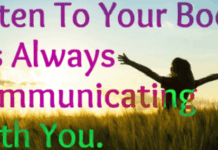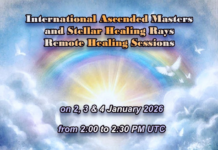
By:
How to Control Your Emotions
http://spiritualityhealth.com/articles/how-control-your-emotions
I’ve been told that I have a fairly broad and deep emotional range. That can be a good thing, because it means I feel things with sensitivity, complexity, and intensity. I notice nuances in myself and others. Feelings, occurrences, people—they matter to me. I even have emotions about my emotions. I know plenty of people who are similar in that way. Having a large emotional range is healthy, mostly—but it means we have more emotions to manage.
Which area of the brain deals with emotions? The limbic system. It includes the amygdala, the hippocampus, the thalamus, and the hypothalamus, among other parts of the brain. This is where emotions originate. When an emotion occurs, it triggers the body to deal with the situation. Your heart rate might speed up or your palms might sweat. A complicated brain circuitry sets things into motion and the body responds. The emotion of Fear serves to protect and defend. Love propels you toward pair-bonding, potential safety, and possibly even the perpetuation of the species. Excitement makes your heart pound and narrows your focus so that you’re prepared to deal with an important moment or an emergency. These automatic reactions can be of great help, for the most part. The question is, Once those emotions occur, what next? Do we need to try to control them?
When I think about controlling my emotions, my first reaction is resistance. That creates a power struggle: me versus my emotions. Am I supposed to wrestle my feelings to the ground, pin them there, count to three, and win? The idea of being a fighter, a warrior, a person who is combating something, especially something as slippery, changeable, and… natural as my emotions, just makes me feel tense and tired.
From experience, I know that there is not much I can do to control my emotions. They bubble up, surface, swirl, rise, and fall. If I start batting them down, choking them off, or squashing them before feeling them, examining them, and even sometimes (unhappily) enduring them, I won’t get very far.
Beyond my own personal experience, I think about some of my former therapy clients who delayed their own progress by refusing to feel. One client I’ll call David rejected the idea that he needed to grieve the loss of his girlfriend. He moved on without looking back, went to parties, pretended she never existed, and insisted that he was better off that way. His therapy stalled until he came into session one day and played me a song from his iPod. He said the music reminded him of what he had experienced with his girlfriend—her sweetness and her pet peeves, the way she said his name, and her funny way of looking at him when he made a joke. The music took him back and he began to remember what was good, what was not, and how he felt when the relationship ended. Fear and pride had kept David from admitting his feelings of love and sadness and grief. Fear, Pride, Love, Sadness, Grief: you’re not likely to escape any of these feelings for long.
I told David to let himself feel—that’s a positive thing. Sit with it. Notice it. Allow it to exist and then take a look at it. The idea isn’t to revel in anger or hatred or to throw yourself headlong into jealousy or fear….or even to swim around in love or to get lost and awash in adoration. The idea is to feel your emotions, pay attention to them, and learn from them. They provide clues to places where, perhaps, you might need more growth or development or awareness. They also draw your focus to places where you are already mature and wise, offering a reminder to use these same skills in other areas. Your feelings give you information about where you’re slightly off-track, right on target, or completely off the map.
Unlike David, another client I’ll call Sheila took the opposite approach. Sheila didn’t resist feelings; she augmented them, whipping them artificially into a frenzy, creating theatrical, beautifully dramatic scenes in which nothing but emotion mattered. Sheila was someone who would rush toward emotion, increasing it if she could, almost as if she wanted to get drunk on it. With Sheila, I talked about slowing down, feeling the natural intensity of the emotion without artificially increasing it, letting it rise and fall on its own. I asked her to take an interest in what was really happening rather than concocting “a more interesting story.” Once she let the actual feelings at their actual levels of intensity sit with her for awhile, she began to look for the real story behind them instead of being distracted by false drama.
All of this is to say that denying feelings or purposefully escalating them doesn’t help much, at least not for long. The better answer is to allow the feelings to exist, notice them, be curious about them, and then ask yourself what, if any, healthy and positive action you could take based on those feelings. Most of us want to be good people, to be kind and loving and warm toward ourselves and others. Controlling your emotions is not all it’s cracked up to be. If you want to control something, a worthier goal is to control your behavior. You don’t always have a choice about how you feel, but you do have many choices about how to behave. What you learn from your feelings can guide you.
Here are some pointers:
- Notice your feeling as it arises.
- Do not squash the feeling or avoid it.
- Do not artificially manufacture a more intense emotion.
- Be curious about your emotion and willing to learn from it.
- Consider carefully what healthy actions, if any, you might take based on that emotion.
Along with that, some reminders:
- Resistance to emotion creates problematic behavior.
- Dramatic, false emotion also creates problematic behavior.
- Real emotion is instructive and, with time, can lead to more balanced, thoughtful behavior.
Your emotions are essential. They connect you to other people and provide you with information about yourself. Emotional control has to do with regulation; it doesn’t mean avoidance or white knuckles or stoicism. It doesn’t mean squashing your feelings or needlessly expanding them. If you have control over your emotions, you’re not afraid to feel, and you understand that your feelings won’t last forever. Use your emotions as a path toward greater understanding and as a way to inform the decisions you make about how to behave in the world.
Disclaimer: We at Prepare for Change (PFC) bring you information that is not offered by the mainstream news, and therefore may seem controversial. The opinions, views, statements, and/or information we present are not necessarily promoted, endorsed, espoused, or agreed to by Prepare for Change, its leadership Council, members, those who work with PFC, or those who read its content. However, they are hopefully provocative. Please use discernment! Use logical thinking, your own intuition and your own connection with Source, Spirit and Natural Laws to help you determine what is true and what is not. By sharing information and seeding dialogue, it is our goal to raise consciousness and awareness of higher truths to free us from enslavement of the matrix in this material realm.
 EN
EN



























Thank you, Danell these are tips will be useful from now and until the time of the event currently I’m focusing applying these techniques to help others at the time of event. 🙂 I’m still learning alot but I’m confident I can help should the need arise. I’m currently holding the light while going through scenarios that may play out both positive and negative. Right now there is at least a few members of my family that I will probably have to assist. No doubt, I will also be reassuring their friends and extended family as well. I’m ok with that!
Sometimes it’s the little things we need to focus on in taking care of ourselves. Then helping others. Keeping holding that light – you are so needed.